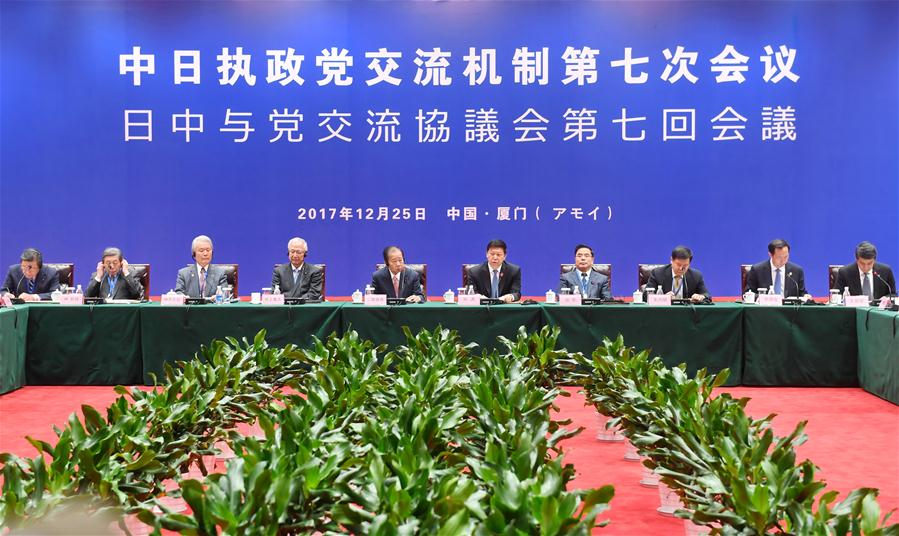Cooperation will boost China-Japan relations
By Jin Yongming | China Daily | Updated: 2018-01-03 07:37

The year 2017 marked the 45th anniversary of the normalization of China-Japan diplomatic relations. But instead of celebrating the occasion, the two sides remained locked in an almost frozen political relationship thanks to a series of standoffs between Tokyo and Beijing, including the detainment of Chinese fishermen by Japanese officials on Sept 7, 2010, and the "nationalization" of Diaoyu Islands by the Japanese government on Sept 10, 2012.
While different views on historical issues have for long prevented the deepening of Beijing-Tokyo ties, both the Chinese and Japanese governments have been striving to improve bilateral relations. For instance, the two sides arranged several meetings between the leaders in 2017, including the meeting between President Xi Jinping and Japanese Prime Minister Shinzo Abe on the sidelines of the G20 Summit in Hamburg, Germany, on July 8 and the 25th APEC Economic Leaders' Meeting in Danang, Vietnam, on Nov 11.
This is an encouraging sign, as exchanges at the highest level and the resultant consensuses reached are vital to the improvement of bilateral ties. With the relatively frequent engagement and exchanges between the top leaders of the two sides steering the way, China-Japan relations seem like changing for the better, which will not only serve the two sides' interests but also be beneficial for the stable development and security of the entire Asia-Pacific region.
Given the growing uncertainties and destabilizing factors in the Asia-Pacific and beyond, Xi has called on all countries to work together to build a community of shared future for humankind, promote lasting peace, and guarantee common prosperity and security. Xi has been reiterating that China is committed to settling disputes through dialogue, resolving differences through discussions and deepening relations with its neighbors in accordance with the principle of amity, sincerity, mutual benefit and inclusiveness.
As two heavyweights in the Asia-Pacific, China and Japan should set an example for the other countries in the region by expanding their common interests so as to develop a "major-country relationship" in the new era. And, owing to the numerous sensitive and complex issues involved, it would be wise on their part to adopt temporary measures and reach agreements on concrete issues first, especially on the maritime dispute in the East China Sea, which is of vital interest to Beijing.
The year 2018 marks the 40th anniversary of the signing of China-Japan Treaty of Peace and Friendship, so it is important the two countries use the occasion to improve bilateral ties and cooperate to resolve specific issues.
I believe China and Japan should start by making endeavors to first settle the maritime dispute because of the high degree of attention it draws. Although persistent confrontations and disagreements on the issue have significantly affected China-Japan ties, the two sides are intent on managing their differences. This is reflected in the multiple rounds of high-level consultations on the maritime issue and the broad consensus reached between the two sides in several areas, including maritime search and rescue operations, exchange of information on maritime law enforcement and the resumption of the China-Japan Marine Policy Forum. The deepening of cooperation in these areas is also likely to help improve bilateral ties as a whole.
Second, Beijing and Tokyo should identify the areas where their common interests converge and endeavor to maximize each other's interests. Of course, the two sides should take each other's concerns and interests into consideration while working together so that they can develop enduring, consistent and profitable cooperation, which in turn will boost the China-Japan relationship. In this regard, the Belt and Road Initiative can serve as an excellent starting point, as Japan can participate in some of the initiative's projects and work with China in a third country.
Third, both sides should make greater efforts to facilitate exchange visits by Xi and Abe, as China-Japan relations can be strengthened on the basis of the consensuses reached by the two leaders, and if Japan understands China's development direction and intentions. And since China-Japan relations are subject to the influence of third parties, it is very important that they appropriately manage their relations with third parties.
In other words, to strengthen bilateral relations, China and Japan should jointly work out a fruitful cooperation mechanism and make substantial achievements in 2018, which will help ensure China-Japan relations are no longer vulnerable and perilous.
The author is a researcher at the Institute of Law of Shanghai, Academy of Social Sciences, and the deputy head of Shanghai Association for Japanese Studies.
























